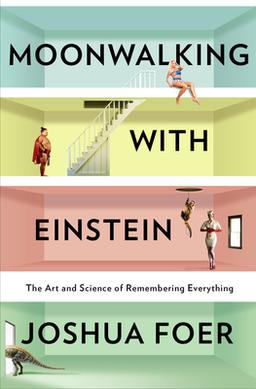 Cover (Photo credit: Wikipedia)
Cover (Photo credit: Wikipedia)Hundreds of years ago, human memory was considered a vital part of being, a mirror to civilization, a reflection of erudition, knowledge and learning. This was the time when books were not in existence. Today, however, we'd be hard pressed to remember our home telephone number, or even the license plate of our car. We've successfully externalized our memory to such an extent that we hardly need to remember anything at all. We'd be in big trouble if our cell phone crashed, or our Internet connection went away or our disk drives failed us. How did this happen? Are we getting dumber? Will our children be able to remember anything other than experiences? Washington Post scribe, Joshua Foer, tries his hand at participatory journalism and explores the past, the present and the future of the murky world of human memory. In the process, in an effort to explore if our memories can truly be enhanced through rigorous practice and methodical training, he competes in the US Memory Championships (yes there is such a thing, believe it or not) -- with hilarious results and an edge-of-the-seat finale -- and much of that interesting and mind bending journey forms the bulk of this smashing debut.
Foer’s journey begins when he witnesses ‘mental athletes’ competing for the title of US Memory Champion, as part of science journal story. Here a small group of dedicated individuals try and remember long and convoluted bits of poetry, memorize shuffled packs of cards in under two minutes and remember a gazillion names and faces from a random slide show. He is suitably impressed enough to try and investigate how these competitors train for championships. Are they high IQ individuals? Do they have innate memory skills? Are they somehow different from the average Joe? The answer is clearly no. As Foer digs into scientific literature regarding our brain and our memory, we understand that it is possible you and me to memorize a pack of cards backwards, as long as we know how to. It’s almost like a magic trick. You just need to know the mechanics of the deception. And then practice. The memory techniques used by competition athletes date back to the classical times, and involve converting the object that we wish to remember into a memorable image and then storing that image in a designated area of a mental ‘Memory Palace’. So let’s assume you need to memorize your grocery list. Drop a bag of laughing potatoes on your living room couch, a bottle of sauce spraying its contents on the coffee table and a bunch of high-jumping onions in the kitchen table. Then all you need to do is walk through your house in your mind’s eye recalling these images. This takes practice and a mind innovative enough to keep conjuring memorable images – nothing more. Variations of this technique can be used to remember not only your grocery list, but also thousands of random numbers as well as packs of cards. Interestingly, along his journey from being memory novice to mental champ,Foer gets access to and interacts with people from both spectrums of the memory divide - from the autistic Kim Peek (from whose life 'Rain Man' was inspired and a memory savant who has memorized nine thousand books, but who has an IQ of 87) to the most forgetful man in the world, who cannot remember anything beyond five minutes - and their conversations offer insight into the significance of memory in a time dominated by smart phones and Google. As he delves further, he concludes that contrary to what we normally believe, memory is not a matter of dumb or genius. It is instead like any significant human endeavour, a matter of technique and practice.
But in the end, enjoyable as the book is, does it make a point? Can training our memories for the better make us smarter? Does it open up our brains to some higher level of activity? We might do better in examinations and tests, but do we become better thinkers? These are all questions the book throws up, but answers inadequately. While the art of memorizing can be mastered by all, all things considered, is the ability to memorize anything just a fancy party trick, whose novelty quickly wears off? To become better thinkers, we need the right balance of trained memory and creative thought. An overdose of either skews things. New data can make sense to us only if associated with something we already know. For good reason the modern education system has swung some degree away from focusing on the rote memorizing into the direction of trying to develop people who think creatively, but perhaps somewhere along the way memory has been denigrated in the process. And as the author demonstrates himself, we can easily correct the balance, if we want to. Zemanta" style="border:none;float:right">
Zemanta" style="border:none;float:right">
2 comments:
Thanks for sharing such an amazing content. Really loved to read such content. Keep posting such content in future as well.
Nitro Pro Crack
GOM Player Plus Crack
5KPlayer Crack
Avira Antivirus Pro Crack
LinkAssistant Crack
Viber for Windows Crack
I really love your work it’s very beneficial to many people’s. Your blog approach helps many people like myself. Its content is very easy to understand and helps a lot,
Do visit my site for new and Updated software:
Artweaver Plus crack
Duplicate Photo Cleaner crack
WebcamMax Crack
Airy crack
Serviio crack
Active Boot Disk Crack
Post a Comment